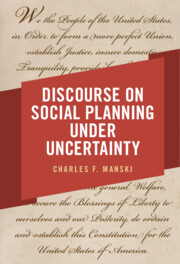Book contents
- Discourse on Social Planning under Uncertainty
- Discourse on Social Planning under Uncertainty
- Copyright page
- Dedication
- Contents
- Preface
- 1 Credible Planning under Uncertainty
- Part I Characterizing Uncertainty
- 2 Incredible Certitude
- 3 Identification of Treatment Response
- 4 Identification of Choice Behavior and Personal Welfare
- Part II Analyses of Planning Problems
- References
- Index
4 - Identification of Choice Behavior and Personal Welfare
from Part I - Characterizing Uncertainty
Published online by Cambridge University Press: 02 January 2025
- Discourse on Social Planning under Uncertainty
- Discourse on Social Planning under Uncertainty
- Copyright page
- Dedication
- Contents
- Preface
- 1 Credible Planning under Uncertainty
- Part I Characterizing Uncertainty
- 2 Incredible Certitude
- 3 Identification of Treatment Response
- 4 Identification of Choice Behavior and Personal Welfare
- Part II Analyses of Planning Problems
- References
- Index
Summary
I mainly discuss revealed preference analysis, which assumes that choice results from maximization of personal welfare. Section 4.1 discusses revealed preference analysis in some generality. Section 4.2 focuses on identification of income-leisure preferences for evaluation of income tax policy. Whereas Sections 4.1 and 4.2 concern behavior in deterministic settings, Section 4.3 considers identification when it is assumed that individuals cope with uncertainty by maximizing expected utility. Going beyond revealed preference analysis, Section 4.4 discusses identification using subjective data in place of or in addition to observations of actual choices.
Information
- Type
- Chapter
- Information
- Discourse on Social Planning under Uncertainty , pp. 93 - 114Publisher: Cambridge University PressPrint publication year: 2025
